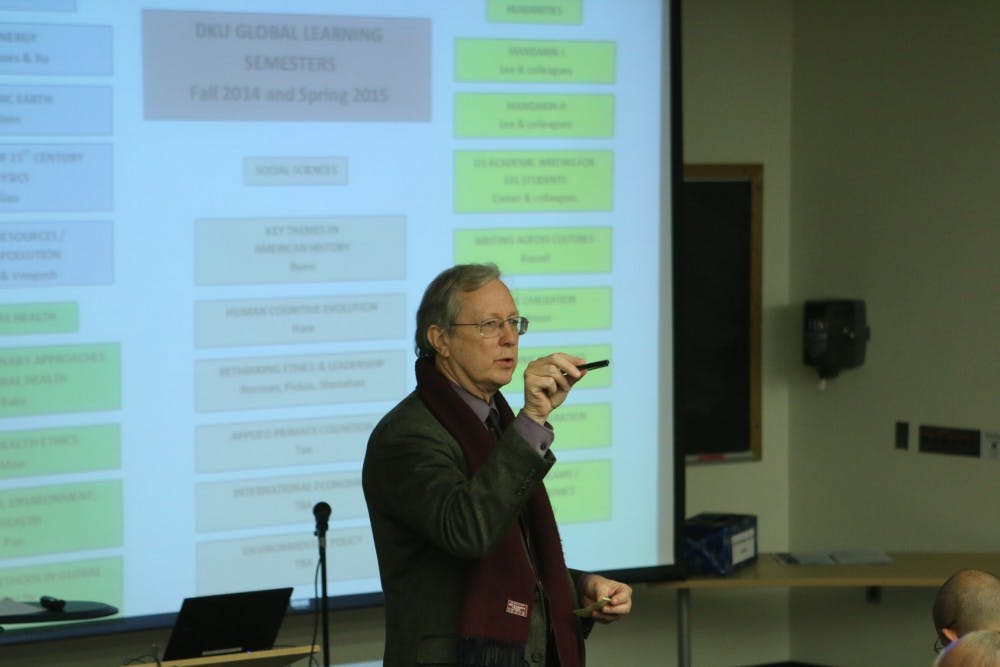The Arts and Sciences Council discussed courses for Duke Kunshan University and developments in Duke's commitment to online education at its meeting Thursday.
The 17 courses fall under the categories of physical and natural sciences, global health, social sciences and humanities as part of the undergraduate study abroad semester that will begin in Fall 2014. Faculty members from the Durham campus will teach the courses, which include Haiyan Gao—chair of Duke's physics' department—and Vicki Russell—senior lecturing fellow and director of the Thompson Writing Program.
DKU's undergraduate offerings will comprise just a study-abroad semester for the first several years. These initial study abroad courses will be seven weeks long as opposed to the more traditional 14-week semester, said Thomas Robisheaux, chairman of the council and Fred W. Schaffer professor of history, who also serves as the chair of the DKU joint committee ad hoc.
“Faculty will need to think about how to teach a full course within a seven week format,” he said. “It’s just one of the challenges of teaching at DKU.”
Course topics include Greek civilization, human cognitive evolution, global health ethics and frontiers of 21st century physics.
Robisheaux added that the Council intends to support DKU just like they support the faculty of the Trinity College of Arts and Sciences on the Durham campus.
“I want you as Arts and Sciences representatives to view DKU as people,” Robisheaux said. “DKU is not just some far away concept that you’ve seen in slides, but some of your colleagues are now committed to it.”
In addition to listing courses that had already been proposed, Robisheaux also highlighted the involvement of members of the council serving on the joint committee as advisors to DKU’s Liberal Arts in China Committee.
Ken Rogerson, a member of the LACC and dean of undergraduate studies at the Sanford School of Public Policy, said he is addressing questions related to offering courses in another country.
“Our initial concern was that only three people would turn in proposals for courses at DKU,” Rogerson said. “We’re really happy to see the breadth of topics, disciplines and issues that are being proposed and we’ll be happy to look at as many more as would like to come in.”
He added that these study abroad courses do not constitute a full curriculum, but are instead simply what the Duke faculty has to offer at this time. It is the LACC’s job to develop a curriculum that will be implemented when DKU expands to offer a full undergraduate degree in five years, he said.
“This year will be a year of learning and then over the summer we will meet...to begin the very long five-year process of developing this curriculum,” said Laurie Patton, dean of arts and sciences.
She noted that the LACC is working to create three subcommittees—focusing on “liberal learning in China, pedagogy assessment and student experience and academic freedom.”
The developments on online courses across the various departments of the Trinity College of Arts and Sciences were additionally covered at the meeting.
Robisheaux noted the online education faculty forums that have been held monthly this semester.
“We want folks who have deep concerns who were part of the conversation last Spring to come, otherwise this feels like a lopsided conversation,” Patton said.
He said that recommendations and ideas for online courses from each department should be compiled by the Spring.
“You are the ones who are driving this agenda,” Robisheaux said. “What do you know will really enhance your own department’s course offerings?”
In other business:
Several departments discussed their efforts to strengthen curriculum through assessment following the work of a committee focusing on methods of assesment.
Richard MacPhail, professor of chemistry, noted his department’s implementation of diagnostic quizzes to determine placement. He explained the system—which Lee Baker, Trinity dean of academic affairs, describes as “red shirting”—is a good opportunity for students who are not prepared for the traditional gateway course.
MacPhail noted that red shirting is a good strategy for accommodating students who do not have strong backgrounds in chemistry prior to attending Duke.
Kristen Neuschel, associate professor in the Thompson Writing Program, said that in her own department, analyzing assessment caused her and her colleagues to rethink the rubrics they had in place.
Baker said that the committee focusing on assessment had shown strong leadership.
“They have been effective in changing the culture of faculty assessment,” he said.
The council also voted to pass an expansion of the linguistics program to include secondary and joint appointments. The change had been proposed by Edna Andrews, professor of linguistics and cultural anthropology, during last month's meeting.
“No more sleepless nights, Edna,” Robisheaux said. “We’re all looking forward to the secondary appointments.”
Robisheaux also noted a new representative to the council—Cheri Ross, interim director of international comparative studies. Ross has been elected to serve as a representative to the council following ICS’s elevation to program status last year.
Get The Chronicle straight to your inbox
Signup for our weekly newsletter. Cancel at any time.

